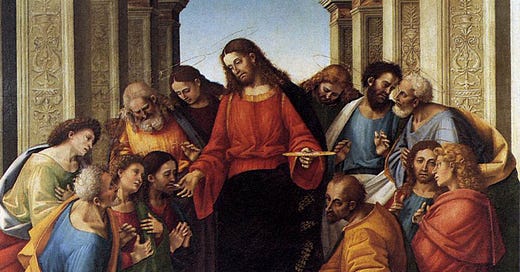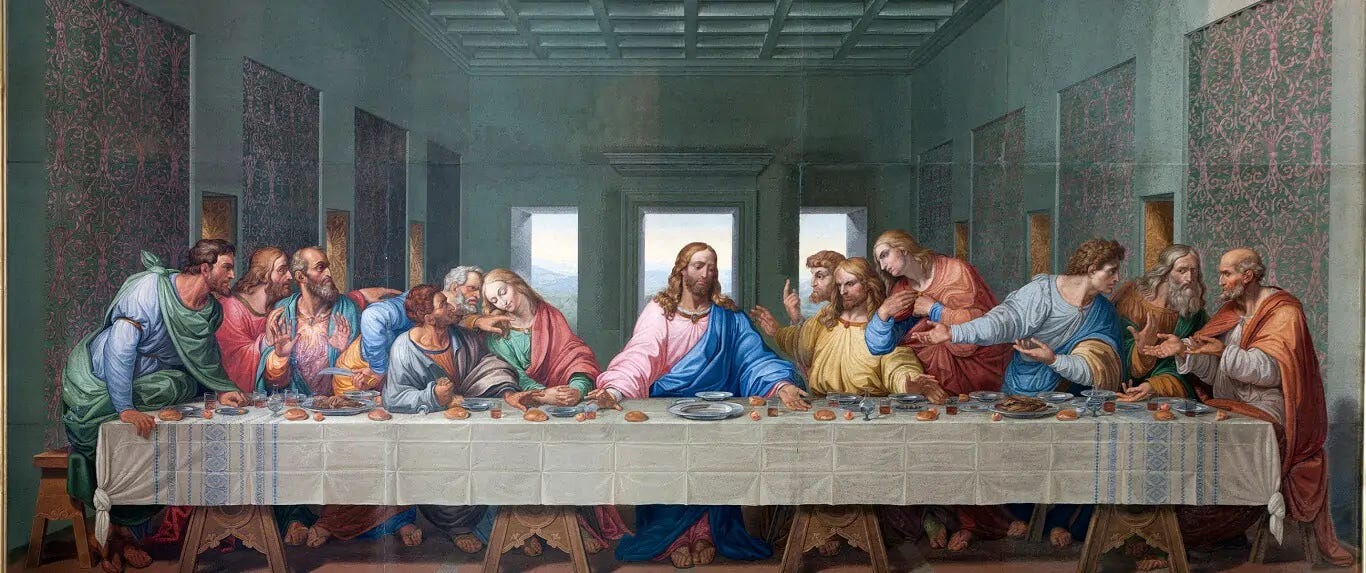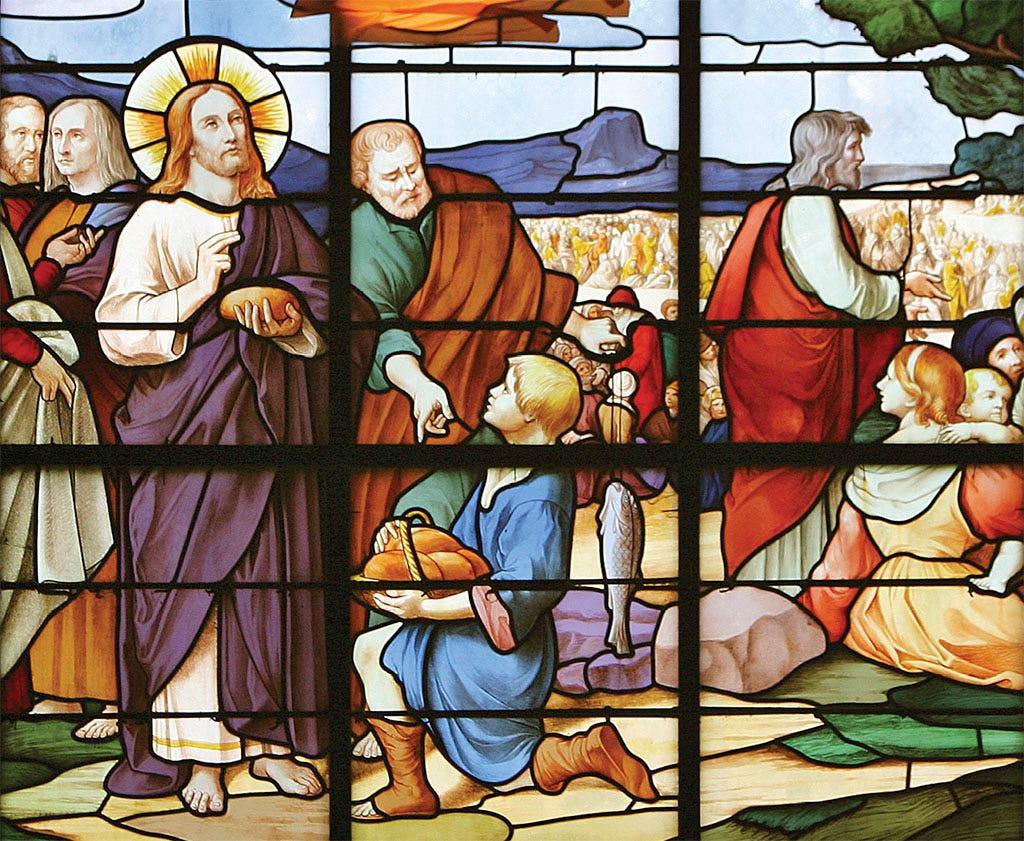The "Radical" Eucharist: Idol, Symbol, or Christ Himself?
A Biblical review of Jesus's explanation of a controversial Sacrament.
“NO—we’re not like Roman Catholics who believe this is really the body of Christ.” Sitting, listening in a Baptist Church pew, the associate pastor of the congregation continued to mock and take sharp jabs at Catholics as he spoke about the solely symbolic nature of Communion.
I found it quite off-putting—more so than anyone else around me, I think. My wife, originally from a Presbyterian Church, didn't seem too taken aback. Nonetheless, we finished the service and went home.
For months, we’ve been visiting different churches around town trying to get back into the faith. I took quite a Christian sabbatical after my family stopped going to Church, and I was ready to reestablish my relationship with Christ at 22.
After 'church hopping' from denomination to denomination, we eventually established roots in the Catholic Church. Seven years later, both my wife and I were Confirmed.
Reflecting on my time visiting with various Christian faiths on Sundays or with friends, I’ve relived and witnessed several instances similar to what I experienced in that Baptist Church at 22. Some firsthand, some through others.
Recently, I heard Fr. Mike Schmitz on “The Catechism in a Year Podcast,” share a similar story. He reserved space at a non-Catholic Christian church camp, whose board of directors later contacted him with a “problem.”
He later learned that the board of directors didn’t want them at their camp facility due idolatry being committed on their grounds. They were specifically referencing the worship of the Eucharist, kneeling and “worshiping as if that bread and wine really is God,” as Fr. Schimtz shared.
That was when he transitioned to a semblance of agreement: In response, he said, “That’s true. That’s correct.”
And if what Catholics believed wasn’t true, and the Eucharist was indeed just bread and wine, we’d have a real problem on our hands. Fr. Mike goes on to say that it would be akin to, or even worse than the worship of the golden calf in the book of Exodus.
So, are Catholics idolaters, offering reverence and worship to merely bread and wine? Given that many other non-Catholic Christians, mainly Orthodox Christians, and Lutherans, for example, believe in the Real Presence of Christ in the Eucharist, I argue that we must explore further.
Idolatry, per the Old Testament by God the Father in Exodus 20:3 is as follows:
3 “You shall not have other gods beside me.*
4 You shall not make for yourself an idolc or a likeness of anything* in the heavens above or on the earth below or in the waters beneath the earth;
5 you shall not bow down before them or serve them…”
This accounts for the fact that, of course, worshiping idols can take a lot of forms not just in the form of explicit worship; money or your career can even be considered idols when someone behaves subservient to it, placing it above God.
So, does the Eucharist qualify as an 'other god' or an idol? Do Catholics, in this case, worship mere objects like bread and wine? Let’s begin with Holy Scripture.
At the Last Supper:
26 “Jesus took bread, said the blessing, broke it, and giving it to his disciples said, “Take and eat; this is my body.”* k
27 Then he took a cup, gave thanks,* and gave it to them, saying, "‘Drink from it, all of you,
28l for this is my blood of the covenant, which will be shed on behalf of many for the forgiveness of sins.’”
Jesus, the Son of God and second person of the Holy Trinity, explicitly said that the bread, after a blessing, was His body.
But was he speaking symbolically? The Gospel of John gives us a glimpse into this answer.
In John 6, Jesus said,
48 “I am the bread of life.
49 Your ancestors ate the manna in the desert, but they died;z
50 this is the bread that comes down from heaven so that one may eat it and not die.
51 I am the living bread that came down from heaven; whoever eats this bread will live forever; and the bread that I will give is my flesh for the life of the world.”a
52 The Jews quarreled among themselves, saying, “How can this man give us [his] flesh to eat?”
How can this man give us His flesh to eat, they said.
Further, Jesus explains,
53 “Amen, amen, I say to you, unless you eat the flesh of the Son of Man and drink his blood, you do not have life within you.
54 Whoever eats* my flesh and drinks my blood has eternal life, and I will raise him on the last day.
55 For my flesh is true food, and my blood is true drink.
56 Whoever eats my flesh and drinks my blood remains in me and I in him.”
The disciples who were there, not convinced, murmured:
“This saying is hard; who can accept it?”
Jesus did not respond with, “No, this represents my body,” or “Friends, this is symbolic: I am merely the essential source of spiritual nourishment.” Instead, He pressed into their disbelief with four very powerful words:
“Does this shock you?”
As a result, many of the disciples there left Him, going back to their old ways. And afterward, Jesus looked to the Twelve Apostles, asking them if they also wanted to leave–suffice it to say, they did not.
Many believe that the disciples that left, did so only because they thought He was talking literally when He was really speaking symbolically. But broader context with other passages portray that He does elaborate when His followers didn’t understand, or even took Him too literally, like in Matthew 16.
5 “When the disciples reached the other side, they had forgotten to bring any bread.
6 Jesus said to them, “Take heed and beware of the leaven of the Pharisees and Sadducees.”
7 And they discussed it among themselves, saying, “We brought no bread.”
8 But Jesus, aware of this, said, “O men of little faith, why do you discuss among yourselves the fact that you have no bread?
9 Do you not yet perceive? Do you not remember the five loaves of the five thousand, and how many baskets you gathered?
10 Or the seven loaves of the four thousand, and how many baskets you gathered?
11 How is it that you fail to perceive that I did not speak about bread? Beware of the leaven of the Pharisees and Sadducees.”
12 Then they understood that he did not tell them to beware of the leaven of bread, but of the teaching of the Pharisees and Sadducees.
As Brant Pitre writes in Jesus and The Jewish Roots of the Eucharist, “His disciples’ primary problem was not that they didn’t understand Him. Their problem was that they didn’t believe Him.”
The more you know about Jewish tradition, the more you, at the very least, understand why some disciples left. How absolutely radical this may have sounded is clear. The concept of drinking blood of any living creature was strictly forbidden, per the Old Testament Scriptures, and something that was practiced only by pagans.
In the end, Jesus Himself was clear: The Eucharist, i.e. Holy Communion, is not mere bread and wine. Quite literally, it’s the Body and Blood of our Lord, in the species (or appearance) of bread and wine–what is known as the “Real Presence” of Christ. This doctrine is central to the faith and one of its greatest and most profound Sacraments and Mysteries (more on this in future posts).
But just as it occured around two thousand years ago, the Eucharist, to this day, divides followers of Christ in a significant way. It divides to the extent that some will even call others heretics, idolaters, or worse–lambasting them, urging them to repent.
As I referenced briefly at the beginning of this post, the concept of the Eucharist is not a distinctly Roman Catholic doctrine; Orthodox Christians, who split from The Church in the 11th century in an event known as “The Great Schism” also believe in the Real Presence of Christ in the Eucharist. And even more traditional Protestant denominations, like Lutherans, believe in it also.
The intricate doctrinal details and specific liturgical practices, yes, are debated. But to suggest that the Real Presence it is not Biblical, however, is not held up to scrutiny. Not to mention in the context of the historical Christian Church.
Writings of Early Church Fathers, as they professed their love for the Sacrament and defended themselves against accusations of cannibalism, and the substantive conversations that arose out of echumenical councils make this clear.
So, this leaves us to this question: Are Catholics (or other denominations, for that matter) idolaters or heretics, believing that the Eucharist is the actual body and blood of our Lord Jesus Christ? Was Christ speaking in strictly symbolic terms, not literal?
Fortunately, for those who believe in the Real Presence, worshipping Christ in the Eucharist is not idolatry, heresy, nor mere symbolism. Two thousands of years of Church history, to include both tradition and scripture, would support this assertion.
While it’s absolutely true that Jesus an essential source of spiritual nourishment, just as bread nourishes us physically, this symbolism doesn’t negate the doctrine of the Real Presence.
To do so would be, as the saying goes, throwing the baby out with the bathwater. Both aspects, symbolic and real, and essential to understanding the mystery of the Eucharist, and what makes it the truly the “source and summit of the Christian Life.”
In amore fraterno,
Josh






